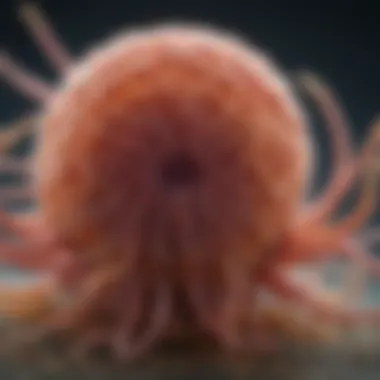Deciphering the Complexities of Parasite Elimination in the Human Body


Research Overview
Health Implications
The research on parasite elimination has significant implications for human health. By understanding how the body rids itself of parasites, we can explore potential benefits and risks associated with different elimination strategies. These findings can be applied practically in daily life by adopting preventive measures to minimize exposure to parasites and seeking timely medical assistance when needed.
Well-being Strategies
Derived from research on parasite elimination, practical well-being strategies can be implemented to enhance overall health. Recommendations include maintaining hygiene practices, consuming a balanced diet to boost immunity, and seeking professional medical advice for timely diagnosis and treatment. Personal testimonials and case studies further illustrate the effectiveness of these strategies in promoting wellness.
Expert Insights
Experts analyzing research findings emphasize the importance of understanding parasite elimination mechanisms in the human body. Q&A sessions with relevant professionals shed light on the implications of these findings for public health. Their insights provide a deeper understanding of the complexities involved in combating parasitic infections and emphasize the interdisciplinary approach required for effective parasite elimination.
Introduction
In this section, we delve into the fundamental aspects surrounding parasite elimination in the human body. Understanding how the body combats parasitic infections is crucial in promoting overall health and well-being. By shedding light on the intricate mechanisms involved in the elimination of parasites, we aim to equip our readers with valuable insights that can empower them to make informed decisions regarding their health.
Impact of Parasites on Human Health
Types of parasites affecting humans
Exploring the diverse range of parasites that can affect humans is essential in understanding the scope of parasitic infections. From protozoa to helminths, each type brings forth unique challenges and implications for human health. Delving into the characteristics of these parasites sheds light on their modes of transmission, lifecycle, and the specific health risks they pose. Understanding these nuances is key to devising effective strategies for parasite elimination.
Health consequences of untreated parasitic infections
Neglecting the treatment of parasitic infections can have profound implications on human health. From nutrient deficiencies to organ damage, the consequences of untreated parasitic infections can be severe. By elucidating the potential outcomes of allowing parasites to thrive unchecked in the body, we underscore the critical importance of timely intervention and effective elimination strategies.


Signs and Symptoms of Parasitic Infections
Common indicators of a parasitic infestation
Recognizing the common signs of a parasitic infestation is paramount in seeking timely medical attention. From gastrointestinal disturbances to unexplained weight loss, these indicators provide valuable clues that can lead to early detection and intervention. By familiarizing ourselves with these symptoms, we empower ourselves to act swiftly in addressing potential parasitic infections.
Diagnostic methods for identifying parasitic diseases
Sophisticated diagnostic methods play a pivotal role in identifying and confirming parasitic diseases. From microscopic examination of stool samples to advanced imaging techniques, these methods offer precise insights into the presence of parasites in the body. By delving into the nuances of these diagnostic tools, we gain a deeper appreciation for the complexity of parasitic infections and the importance of accurate detection.
Natural Defenses Against Parasites
In this article, we delve into the essential topic of Natural Defenses Against Parasites, shedding light on crucial mechanisms that the human body employs to combat parasitic threats. Understanding these natural defenses is paramount in grasping the intricate balance between the body and harmful intruders. By exploring the specific elements and benefits of Natural Defenses Against Parasites, we gain valuable insights into how the body's innate systems operate to protect against parasitic infections. This section serves as a foundational explanation of how the body's defenses play a pivotal role in maintaining overall health and well-being.
Immune System Response
Role of the immune system in combating parasites
The immune system's role in combating parasites is a critical aspect of our body's defense mechanisms. By recognizing and targeting foreign invaders, the immune system acts as a formidable barrier against parasitic threats. The key characteristic of the immune system lies in its ability to identify and mount specific responses to combat various types of parasites effectively. This targeted approach allows the immune system to adapt and respond promptly to parasitic infections, making it a crucial element in the body's defense arsenal. Despite its advantages in combating parasites, the immune system's response can sometimes lead to inflammatory reactions, which, while effective, may also pose disadvantages such as tissue damage or hypersensitive responses. Understanding the nuances of the immune system's role in parasite elimination offers profound insights into the body's defense strategies.
Inflammatory responses triggered by parasitic invasion
When parasites invade the body, inflammatory responses are triggered as part of the immune system's defensive actions. This process involves various mechanisms that aim to eliminate parasites and restore physiological balance. The hallmark characteristic of inflammatory responses is their rapid onset and coordinated action to contain and eliminate the parasitic threat. This cascade of events signifies the body's robust defense system in action, highlighting the efficacy of inflammation in combating parasitic invasions. However, excessive inflammation can lead to collateral damage and prolonged immune activation, posing potential disadvantages such as chronic inflammation-related complications. Appreciating the intricate nature of inflammatory responses triggered by parasitic invasion provides a profound understanding of the body's dynamic interaction with parasites and underscores the importance of balanced immune responses.
Medical Interventions for Parasite Elimination
In this section, we delve into the pivotal role of Medical Interventions for Parasite Elimination within the broader context of combatting parasitic infections. Understanding the significance of medical interventions is crucial as they form a critical component of the multifaceted approach to eradicating parasites from the human body. By examining the specific elements and benefits associated with these interventions, we gain a deeper insight into their contribution to promoting health and well-being.
Medications and Treatments


Antiparasitic drugs and their mechanisms of action
Antiparasitic drugs play a fundamental role in targeting and eliminating various types of parasites within the human body. These medications operate by disrupting the biological processes essential for parasite survival, ultimately leading to their demise. The key characteristic of antiparasitic drugs lies in their ability to selectively target parasites while minimizing harm to the host's cells, thus enhancing their efficacy in treating parasitic infections. This targeted approach ensures that the drugs act specifically on the parasites, contributing to their widespread adoption as a go-to choice for combating parasitic illnesses. Despite their effectiveness, antiparasitic drugs may have certain disadvantages, such as potential side effects or the development of drug resistance in parasites, factors that must be carefully considered in the context of this article.
Common treatments for different types of parasitic infections
An essential aspect of medical interventions involves the utilization of common treatments tailored to specific parasitic infections. These treatments encompass a range of approaches, including antiparasitic drugs, supportive therapies, and preventive measures designed to combat parasitic infestations effectively. The key characteristic of these treatments lies in their versatility, as they can address a wide spectrum of parasitic infections prevalent in diverse populations. By offering multiple strategies for parasite elimination, these treatments provide a comprehensive solution to the complex challenges posed by different parasitic species. While these treatments are highly beneficial in managing parasitic diseases, some may exhibit certain limitations, such as variable treatment efficacies or the necessity for prolonged treatment durations, aspects that warrant detailed examination within the context of this article.
Lifestyle Adjustments for Parasite Prevention
In the realm of parasite elimination within the human body, lifestyle adjustments play an instrumental role. By adopting specific behavioral changes and practices, individuals can proactively reduce their susceptibility to parasitic infections. The significance of lifestyle adjustments for parasite prevention cannot be overstated, as it forms a critical part of holistic health strategies. From dietary considerations to behavioral practices, every aspect of one's lifestyle can impact the body's ability to ward off parasitic invaders.
Dietary Considerations
Nutritional Strategies to Boost Immune Function:
A pivotal aspect of lifestyle adjustments for parasite prevention lies in enhancing immune function through strategic nutritional strategies. These strategies aim to fortify the body's natural defense mechanisms, making it more resilient against parasitic threats. By incorporating nutrient-dense foods rich in vitamins, minerals, and antioxidants, individuals can bolster their immune response. This targeted approach not only strengthens immunity but also creates an inhospitable environment for parasites to thrive, thus promoting overall well-being.
Foods that Aid in Parasite Elimination:
Another crucial dietary consideration for parasite prevention involves consuming foods that aid in parasite elimination. Certain foods possess inherent properties that help combat parasites within the body. By including these foods in one's diet, individuals can actively support the expulsion of parasites and inhibit their proliferation. Such foods act as natural allies in the ongoing battle against parasitic infections, serving as valuable reinforcements to medical interventions and immune responses.
Behavioral Practices
Avoiding Exposure to Potential Sources of Parasitic Contamination:
One of the fundamental behavioral practices for parasite prevention is steering clear of environments or situations that pose a risk of parasitic contamination. By exercising caution and vigilance in everyday activities, individuals can minimize the likelihood of parasitic exposure. This preventive measure is essential in safeguarding against various parasitic infections and underscores the proactive role individuals can play in protecting their health.
Adopting Healthy Habits to Reduce the Risk of Infections:


Furthermore, adopting a set of healthy habits is paramount in reducing the risk of parasitic infections. These habits encompass practices such as proper hygiene, sanitation, and mindful behaviors that mitigate the chances of parasitic infestations. By cultivating such habits, individuals not only fortify their defenses against parasites but also contribute to the overall enhancement of public health. Consistency in healthy habits forms a robust shield against parasitic threats, reinforcing the body's resilience and fortitude.
Environmental Factors Influencing Parasite Survival
Impact of Climate and Geography
Regions Prone to Specific Parasitic Outbreaks
Delving into the specific nuances of regions prone to parasitic outbreaks unveils vital insights into the geographical patterns of parasite infestations. Certain regions exhibit a higher susceptibility to parasitic outbreaks due to a confluence of environmental factors, such as temperature, humidity, and ecological landscapes. Understanding the unique characteristics of these regions aids in predicting and mitigating the risks associated with parasitic infections, thereby contributing to the overall goal of parasite elimination.
Climate-Related Factors Affecting Parasite Transmission
The intricate interplay between climate and parasite transmission underscores the influence of environmental conditions on the proliferation of parasitic diseases. Climatic variables, including temperature fluctuations and precipitation levels, significantly impact the survival and transmission of parasites. By exploring the correlation between climate factors and parasite spread, a comprehensive understanding of disease dynamics emerges, facilitating targeted interventions and public health strategies to combat parasitic infections effectively.
Sanitation and Water Quality
Connection Between Poor Sanitation and Parasitic Infections
Examining the link between poor sanitation practices and parasitic infections elucidates the fundamental role of hygiene in disease prevention. Inadequate sanitation facilities create a breeding ground for parasites, increasing the risk of contamination and transmission. Recognizing the nexus between poor sanitation and parasitic infections underscores the importance of promoting hygienic practices to mitigate the burden of parasitic diseases.
Improving Water Quality to Reduce Parasitic Risks
Enhancing water quality stands as a cornerstone in reducing parasitic risks and safeguarding public health. Contaminated water sources serve as vectors for parasite transmission, posing a significant threat to community well-being. By implementing water purification methods and stringent quality control measures, the risk of parasitic infections can be attenuated, fostering a healthier environment for parasite elimination.
Emerging Research and Technologies
Innovative Approaches to Parasite Eradication
Exploration of New Drug Targets for Parasite Elimination
The exploration of new drug targets for parasite elimination marks a significant advancement in parasitology research. This aspect focuses on identifying novel molecular targets within parasites that can be leveraged to develop highly targeted and efficient therapeutic interventions. By pinpointing key vulnerabilities in the parasite's biological processes, researchers can design drugs that specifically disrupt these vital pathways, leading to the elimination of the parasite from the human body. The key characteristic of this approach lies in its precision targeting, which minimizes off-target effects and enhances treatment efficacy. This method is deemed highly beneficial for this article due to its potential in revolutionizing parasite eradication strategies, offering a more tailored and potent solution for combating parasitic infections. The unique feature of exploring new drug targets is its ability to disrupt essential parasite-specific mechanisms, leading to a more focused and impactful treatment outcome.
Advancements in Diagnostic Tools for Rapid Identification
The advancements in diagnostic tools for rapid identification represent a crucial aspect of parasite eradication efforts. This development centers on the integration of state-of-the-art technologies and methodologies to swiftly and accurately detect the presence of parasitic infections in patients. By utilizing innovative diagnostic tools such as advanced imaging techniques, molecular assays, and biosensors, healthcare providers can expedite the identification process, enabling timely intervention and treatment initiation. The key characteristic of these advancements lies in their ability to offer sensitive and specific detection mechanisms, enhancing diagnostic precision and efficiency. This choice is particularly advantageous for this article as it underscores the importance of early detection in parasite elimination, facilitating prompt and targeted therapeutic interventions. The unique feature of advancements in diagnostic tools lies in their capacity to streamline the diagnostic process, enabling healthcare professionals to swiftly identify and address parasitic infections, thereby contributing to improved patient outcomes.



